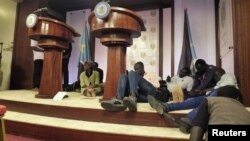South Sudan turned five years old Saturday. But instead of music, whistles and vuvuzelas as in past years, citizens were hearing gunshots.
Late Friday, shooting erupted outside the presidential palace, soon engulfing the whole city. More than 100 people died.
It was the latest clash in a brutal civil war that broke out in 2013. Tens of thousands have been killed as forces of the president, Salva Kiir, fight those of his rival, the current first vice president, Riek Machar.
The two men are accused of leading troops who killed and raped civilians.
Elizabeth Deng, a South Sudanese citizen working for rights group Amnesty International, recalled the hopes of five years ago, before the civil war.
"I remember in Salva Kiir's speech in 2011 on independence day," she said. "He promised ratification of human rights treaties and their implementation. Unfortunately, the government has committed human rights violations without holding its own forces accountable for these, so it seems like those promises unfortunately have not been implemented."
Accord in August
Kiir and Machar signed a peace deal last August and formed a government together in April. But they have been unable to stop violence across the nation.
"Unfortunately, the signing of the peace agreement last August 2015 hasn't really resulted in an end to the conflict," Deng said. "There were recently clashes in Wau that led to significant displacement and estimates of hundreds of civilian deaths, and in Juba over the past few days people have been hearing gunshots."
Corruption has ruined South Sudan's economy. The World Food Program says 4.8 million South Sudanese will face severe food shortages this year, with parts of the country on the edge of famine.
The fighting has forced 2.4 million people from their homes. Hundreds of thousands have left the country as refugees. The U.N. refugee agency predicts a million South Sudanese will leave by the end of this year.
South Sudanese lawyer Dong Luak said the exodus is a vote of no confidence.
"I don't think that there is anyone who has feelings toward South Sudan now as a country," he said. "That is why everyone is leaving the country."
The peace deal, backed by the West, was designed to keep Kiir and Machar, two old adversaries, in power. Dong said that was a mistake.
"I think the best thing is that they are held [to] account [for] the atrocities they have committed. ... Those who committed crimes against humanity and war crimes should be in prisons, not in the palaces," he said.
Party's legacy
Kiir and Machar are members of the same political party, the SPLM. It was once hailed as a liberator for its role in fighting the repressive government of the north in Khartoum.
But Peter Adwok Nyaba, South Sudan's minister of higher education, said the SPLM's legacy was now one of violence and corruption.
"I would say that SPLM as a party does not exist. ... The leadership has failed to transform it from what it is was a liberation movement into a political party, so after two years, it's just a place for looting only," he said.
With war, poverty, and hunger across the land, there was little to celebrate this Independence Day.







